Spy Tool Helped Halt Weapons Parts Sales To Iran - US
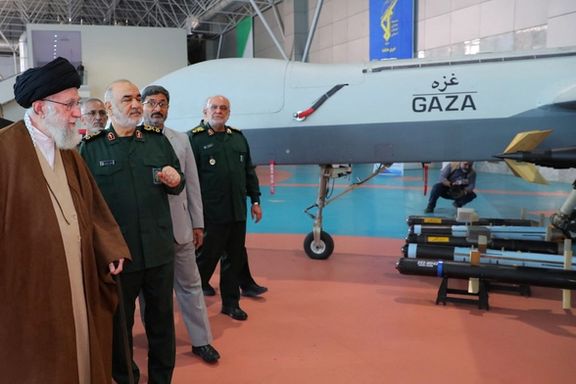
US officials have attributed the prevention of specific weapons parts sales to Iran to a controversial surveillance tool.

US officials have attributed the prevention of specific weapons parts sales to Iran to a controversial surveillance tool.
The CIA and various intelligence agencies leveraged data collected through monitoring the electronic communications of foreign weapons manufacturers, reported Politico on Tuesday.
The surveillance effort successfully thwarted multiple shipments of advanced weapons components intended for Iran via land, air, and sea.
The initiative is in line with the administration's broader objectives to curb Iran's ballistic missile program. Officials express concerns that Iran might be using the program to support Russia in the ongoing conflict in Ukraine. Additionally, efforts are directed towards limiting Iran's involvement in conflicts with wider implications for US national security, including the ongoing conflict between Israel and Hamas.
The revelation serves as the administration's latest argument in favor of reauthorizing Section 702 of the Foreign Intelligence Surveillance Act before its expiration at the end of the year, underscoring its perceived significance for national security.
Officials emphasized the instrumental role of Section 702 in halting weapons sales to Iran. The process involved identifying US-made supplies needed by Iran through other intelligence means and subsequently querying the 702 database for detailed intelligence on the components, including cost, timing, and size.
Specific details about the manufacturers or components involved were not disclosed, and officials spoke on condition of anonymity due to the sensitive nature of intelligence matters.
Last month, the UN sent letters to countries announcing the end of bans on Iran's missile program, removing barriers for the clerical regime to sell dangerous technologies. Iran, historically allied with Russia, faces accusations of supplying lethal drones to Moscow for use in Ukraine, though it asserts its neutrality in the conflict.
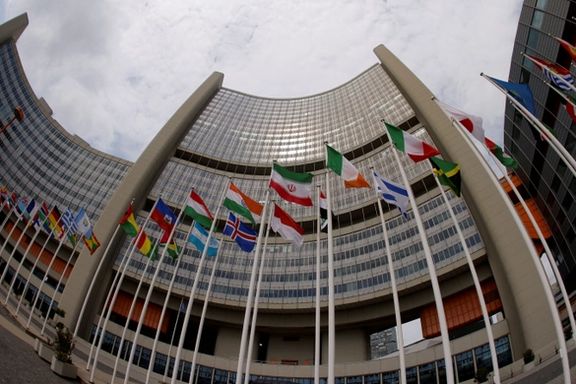
The UN nuclear watchdog claims Iran is not fulfilling commitments and there is no progress ahead, yet no resolution was issued at the body’s key summit.
Washington and its European allies did not move to censure Iran at the critical meeting of the International Atomic Energy Agency (IAEA) in Vienna from November 20 to 24 while Tehran is enriching uranium at levels with no non-military use and is stockpiling more of it.
After the previous round of the 35-nation IAEA Board of Governors meeting in September, the Islamic Republic ejected one-third of the inspectors with expertise in uranium enrichment. And each time the board issued resolutions as the IAEA decided it is “essential and urgent” that Iran act to fulfil its legal obligations and clarify all outstanding safeguards issues without delay, Iran responded by augmenting activities.
Iran has steadily leveled up its nuclear game since 2021, developing more plants, enriching more uranium at higher levels, stockpiling more, and simultaneously eroding IAEA monitoring. The latest IAEA report said Iran has enough uranium enriched to up to 60% for three atom bombs and is still stonewalling the agency on key issues, with IAEA Director General Rafael Grossi highlighting that “significant safeguards issues remain outstanding" in Iran’s nuclear program. Experts say analyzing IAEA recent reports proves that Iran now has enough enriched uranium to produce weapons-grade uranium (WGU) for one nuclear weapon in as little as seven days and up to 12 nuclear weapons in five months.
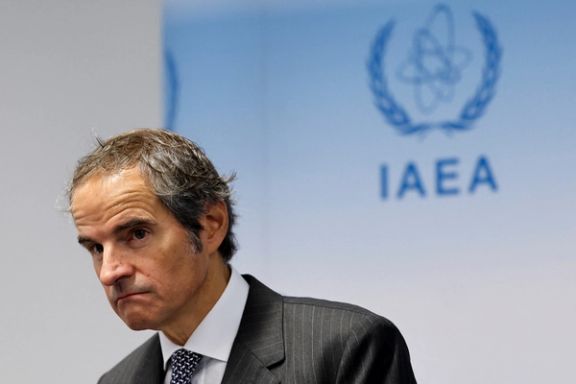
"If Iran fails to implement the essential and urgent actions contained in the November 2022 Resolution and the 4th March Joint Statement in full, the Board will have to be prepared to take further action in support of the (IAEA) Secretariat to hold Iran accountable in the future, including the possibility of a resolution," Britain, France, Germany -- the so-called E3 -- and the US warned in September. Since the last resolution last November, the West has refrained from formally condemning Tehran's progress or setting a deadline for Iran to come into compliance with a five-year IAEA investigation into Iran's violations of the Nuclear Non-Proliferation Treaty (NPT).
Andrea Stricker, a research fellow at the Foundation for Defense of Democracies (FDD), has called on the West to push back Iran’s nuclear advances, asking, “How many inspectors must Iran eject and how many nuclear weapons’ worth of uranium will Tehran amass before the West stands up to the regime? The current approach ensures Iran can stroll to nuclear weapons at a time of its choosing.”
Pointing out Iran’s destabilizing activities, Anthony Ruggiero, Senior Director of FDD’s Nonproliferation Program said, “Tehran funds and supports proxies attacking Israel and is on the threshold of nuclear weapons. President Biden should call for a special IAEA board meeting to censure Iran and support the IAEA’s director general. Washington must fully implement US sanctions and respond to Tehran’s proxies attacking US troops by targeting Iranian personnel responsible for the attacks.”
There is bipartisan consensus at US Congress that a nuclear Iran is unacceptable, but no measure did manage to slow down Tehran’s nuclear drive.
It seems that some of world leaders have come to terms with a nuclear Iran and its hypothetical atomic bombs, and apparently a dozen more states that are at the verge of going nuclear. During the World Nuclear Exhibition in Paris on Tuesday, Grossi said, "We already have 10 countries which have entered the decision phase (to build nuclear power plants) and 17 others which are in the evaluation process. There will be a dozen or 13 (new) nuclear countries within a few years.” Producing electricity also gave birth to Iran’s nuclear program.
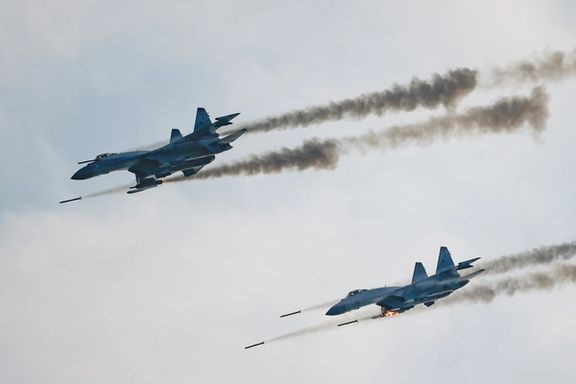
Amid burgeoning ties, Iran's deputy defense minister has announced the purchase of the advanced Sukhoi-35 fighter jet amongst its latest arms deal with Moscow.
Mehdi Farahi told IRGC-affiliated Tasnim news agency on Tuesday that Iran anticipates the delivery of the Mil Mi-28 attack helicopter, Sukhoi-35 fighter jet, and Yak-130 training aircraft imminently as the regime ramps up its supplies from the fellow sanctioned nation.
As of now, Russian authorities have not commented on the latest deal which gives it access to some of Russia's most sought-after technology. Moscow's invasion of Ukraine and its heightened need for weapons, particularly drones, has led to a deepening of ties between the two nations keen to ramp up their military capabilities in the face of global sanctions.
Iran's pursuit of the Russian Sukhoi-35 stems from its perception as a formidable rival to the American F-35. Given the aging fleet of fighter jets, many acquired during the reign of the Shah, the acquisition signals a potential modernization of Iran's air force.
Contradictory statements regarding the acquisition process have become a recurrent theme in Iran's discourse. In June, Air Force Commander Hamid Vahedi expressed the necessity for the Sukhoi-35 but remained uncertain about its deployment timeline.
A month later, the Defense Minister under President Ebrahim Raisi indirectly acknowledged disruptions in the fighter jet purchase contract. Mohammadreza Ashtiani, responding to queries about the Sukhoi-35 acquisition, hinted that the capability for domestic production played a role in the decision.
Speculation surrounding potential disruptions in military cooperation between Russia and Iran has surfaced, with some suggesting that Israel may have influenced Russia to postpone the delivery of the advanced fighter jets.

Hours after Yemen’s government blamed an attack on a ship in the Red Sea on the Iran-backed Houthis, the US announced that the culprits were Somali pirates.
On Sunday, there was an attempted hijacking of a vessel in the Gulf Of Aden, which in the wake of threats by the Houthis to target Israeli-linked vessels in the region, had the hallmarks of the Iranian proxy group.
Missiles had also been fired towards a US vessel, USS Mason, from Houthi-controlled territory in Yemen after it came to the aid of the attacked ship, M/V Central Park. However, the Pentagon was still reluctant to attribute the attack to the Houthis. It remained unclear that if the pirates were Somalis, why were missiles fired from Houthi territories.
”We're continuing to assess, but initial indications are that these five individuals are Somali," said Pentagon spokesperson Brigadier General Patrick Ryder. "It's not clear to us who they were targeting exactly," Ryder said.
On Sunday, the Southern Transitional Council in Yemen had quickly pointed the finger at the group it has been in bitter civil war with for nearing a decade.
“The Houthi seizure of a vessel in the territorial waters of the Gulf of Aden represents an escalation of the pattern of ongoing violations and acts of aggression against the people and the government in Southern Yemen and serves as further evidence that this terrorist group routinely exploits humanitarian issues to conceal its grave crimes against humanity,” a statement said.
Even more strongly, it connected the attack to Iran. “It is also further evidence that the Houthi are acting as a tool of the Islamic Republic of Iran - obedient to its directives and causing harm to its neighboring countries.”
The US removed the Houthis from the list of foreign terrorist organizations in 2021 in a bid to appease Iran and allow humanitarian aid into war-torn Yemen, but the recent wave of attacks in the Red Sea by the group, and missiles launched towards Israel, at war with fellow proxy, Hamas, has raised calls for it to be re-listed.
Senator Bill Hegarty is among those calling for urgent action, saying Biden “must re-designate Iran-backed Houthis as a Foreign Terrorist Organization immediately. Removing them from the FTO list to appease Iran was unconscionable. Houthis are hijacking vessels and firing missiles at US personnel. Why is Biden delaying such an obvious action?”
Others even questioned the fact the attack was blamed on Somalis, who have been relatively inactive in the region for several years.
Jason Brodsky, from United Against a Nuclear Iran (UANI), an advocacy group opposed to the Islamic Republic and critical of the Biden administration's Iran policy, called it an “excuse for more inaction from Biden.
David Friedman, former US ambassador to Israel, also said inaction was making US forces “sitting ducks”, victim to attacks to Iran’s proxies. “Show some strength,” he wrote on X, unperturbed by the news of the Somali allegations, many feeling the trademarks of the Houthis’ recent attacks were simply too close to question.
Since the Hamas invasion of Israel on October 7, in which 1,200 mostly civilians were killed and another 240 or more hostages taken to Gaza, Iranian proxy activity across the region has heightened. Collaboration is high as the united mission to destroy Iran’s archenemies Israel and the US, gains traction.
On Israel’s northern border, Hezbollah has been increasing its attacks, while proxies in Syria and Iraq have also fired towards its border. Attacks on US facilities in Iraq and Yemen have now well exceeded 60 as retaliation for the country’s support for Israel’s relentless retaliation following the invasion, which has since left over 15,000 Gazans dead.
The Houthis have since launched long range missiles towards southern Israel in addition to stepping up its activities in the Red Sea, which it had announced earlier this month, claiming Israeli-backed ships were a “legitimate target” amidst the war in Gaza.
The Galaxy Leader and its 25 international crew were hijacked by helicopter-borne troops just days after the warning was issued by the proxy’s Telegram channel. The Israeli-owned ship was flying the flag of the Bahamas and was chartered by a Japanese group.
Senator Marsha Blackburn also joined the calls for designation, unperturbed by the Somali attribution. “The Houthis just launched ballistic missiles at a US Naval ship rescuing an Israeli-owned vessel,” she wrote, adding, “the US should never bend to terrorists”.
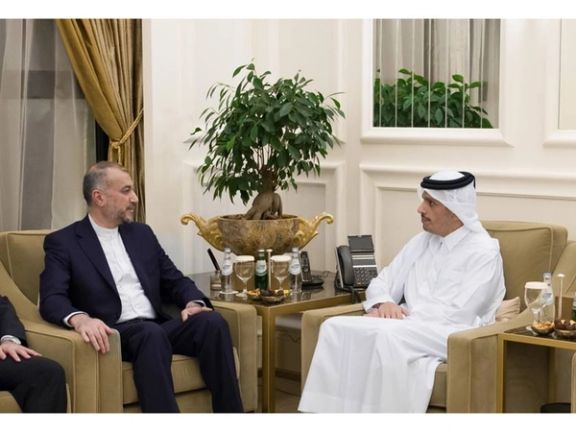
Iran received many messages from the United States in the past six weeks of regional conflict, foreign minister Hossein Amir-Abdollahian told Qatar’s Al Jazeera television.
“Americans always emphasized in their messages that they are not after expanding the war. We responded that although you say you are not after expanding the war, but by standing with the Israeli regime and supplying large quantities of weapons and equipment from American bases in the region, you have practically expanded the conflict,” Amir-Abdollahian said. The messages were delivered through the Swiss embassy in Tehran, he said.
The United States deployed two powerful naval strike groups to the region soon after Israel began its attacks on Gaza, after Hamas’ terror attack on October 7. They deployment was seen as deterrence to Iran and its most powerful proxy force, the Lebanese Hezbollah.
Iran avoided direct military involvement in the Gaza war, but its proxy forces launched attacks against US bases in the region and against Israel.
Amir-Abdollahian referred to these attacks in his interview, as “the natural reaction of resistance forces in the region.” He then went on arguing that militant groups in Iraq, Lebanon and elsewhere in the region are genuine anti-US and anti-Israeli popular forces, failing to mention that Iran’s Revolutionary Guard spent vast sums of money to create these groups and support them.
Although the US retaliated several times against the more than 70 attacks on US forces in past weeks, critics argue that deterrence against Iran has failed and Washington needs to target the Revolutionary Guard directly to prevent more attacks.
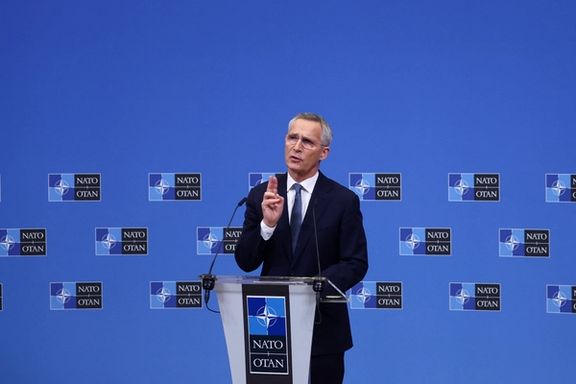
NATO Secretary-General Jens Stoltenberg has urged Iran “to rein in its proxies”, as groups across the region continue to raise tensions in the wake of the Gaza war.
Citing the alliance between Iran, Syria, Hezbollah in Lebanon, and Hamas, Stoltenberg expressed deep concern regarding recent drone attacks targeting ships, US forces, and assaults on commercial vessels in the region. He stressed the critical importance of Iran preventing the conflict from escalating into a full-scale regional war.
It comes on the back of the war in Gaza which began on October 7 when Hamas invaded Israel, murdering 1,200 mostly civilians and taking 240 or more hostage in the most deadly single day since the Holocaust.
In a press conference on Monday, Stoltenberg supported extending the four-day truce between Israel and Hamas, emphasizing the necessity of getting aid into the besieged strip and supporting the release of additional hostages. On Monday night, two more days were agreed by both sides.
Proxies in Lebanon, Syria, Yemen and Iraq have all been activated since the war broke out. Beyond missile and drone attacks, recent weeks have also witnessed Houthi rebels in Yemen attempting attacks on Israeli ships.
Over 60 attacks on US facilities in Syria and Iraq have also taken place since the war as Iran's shadow war steps up its pace.
On Sunday, Houthi rebels, supported by the Islamic Republic, made a seizure attempt on the Liberian-flagged oil tanker Central Park, managed by Zodiac Maritime, in the Gulf of Aden. The Yemeni government, recognized by the United Nations, accused the Houthis of orchestrating the hijacking.
The US military's Central Command released a statement on Monday, confirming that its forces, including the Arleigh Burke-class destroyer USS Mason, responded promptly to the tanker seizure. The statement highlighted that missiles launched by the Houthis landed approximately 10 nautical miles from the ships, resulting in no reported damage or injuries during the incident.